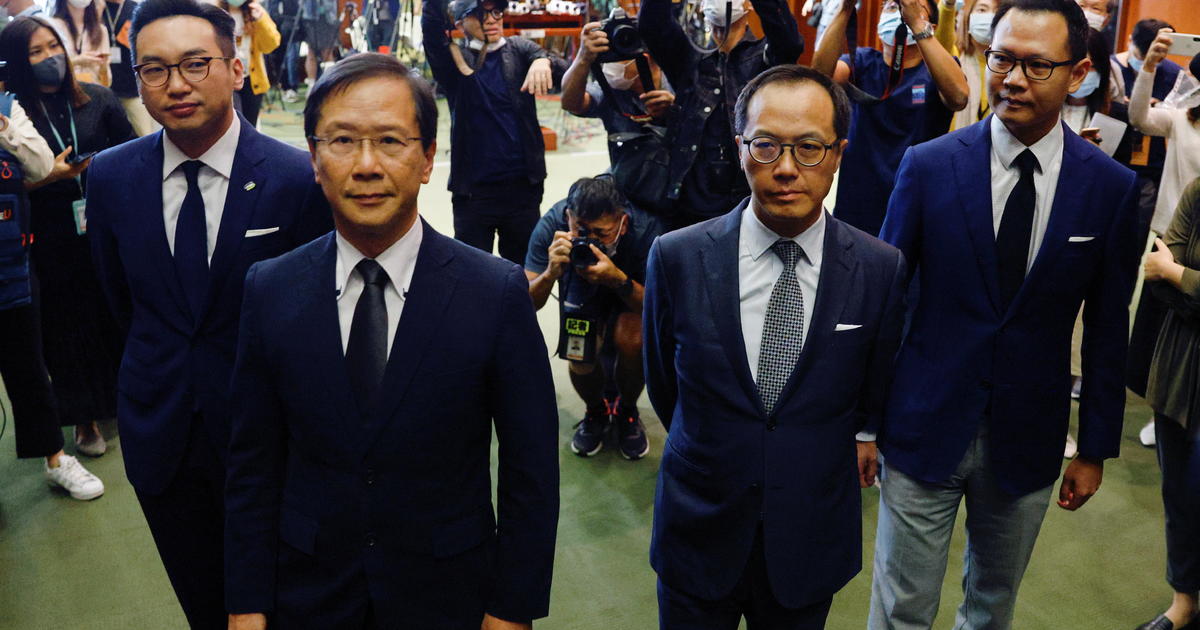Former pan-democratic legislators Alvin Yeung Ngok-kiu, Kwok Ka-ki, Kenneth Leung and Dennis Kwok speak to the media after they were disqualified, in HOng Kong, China, November 11, 2020.
TYRONE SIU/REUTERS
Hong Kong — Hong Kong stripped four pro-democracy lawmakers of their seats on Wednesday, immediately after China gave the city the power to disqualify politicians deemed a threat to national security. Soon after the ousting, the remaining 15 pro-democracy lawmakers on Hong Kong’s Legislative Council said they would resign “en masse” over their colleagues being disqualified.
Hong Kong’s government said the four politicians removed from their seats would “lose their qualification as legislators immediately.”
The statement on the disqualifications came after one of China’s top lawmaking committees ruled that Hong Kong could remove any legislator deemed a threat to national security without going through the courts.
The disqualifications, announced by Hong Kong’s deeply unpopular, Beijing-appointed Chief Executive Carrie Lam, were the latest blow to the city’s beleaguered democracy movement, which has been under sustained attack since China imposed a sweeping national security law. It has used to law to arrest hundreds of people for transgressions ranging from holding posters, to making social media posts critical of China. Many activists have fled overseas.
U.S. imposes sanctions on Hong Kong’s leader
06:26
It was imposed in June to quell months of huge and often violent protests in the finance hub. China’s leaders have described the new law as a “sword” hanging over the head of their critics.
“If observing due process, protecting systems and functions and fighting for democracy and human rights would lead to the consequences of being disqualified, it would be my honour,” Dennis Kwok, one of the disqualified lawmakers, told reporters on Wednesday.
The four had initially been banned from running in the semi-autonomous city’s legislative elections, which were scheduled to be held September 6, after calling on the U.S. to impose sanctions on Hong Kong officials. Those elections were postponed, with authorities blaming the coronavirus.
“We, from the pro-democracy camp, will stand with our colleagues who are disqualified. We will resign en masse,” Wu Chi-wai, convener of the legislature’s remaining 15 pro-democracy members, said later on Wednesday, confirming the mass-resignation.
The move leaves the legislature composed almost entirely of lawmakers toeing Beijing’s line. Hong Kong’s legislature passes the territory’s laws, but only half of its 70 members are directly elected — and a complex appointment system ensures the city’s pro-Beijing establishment was all but guaranteed a handsome majority even before Wednesday’s mass resignation.
Hundreds of Hong Kong protesters arreste
02:37
Scuffles and protests routinely break out in the Legislative Council, with the pro-democracy minority often having resorted to filibustering and other tactics to try to halt bills they oppose.
Lam said the disqualifications of the four men were “constitutional, legal, reasonable and necessary.”
CBS News correspondent Ramy Inocencio said Lam denied that Hong Kong’s legislature would become a rubber-stamp parliament catering to Beijing’s interests, but one top official in Beijing said the expulsion of the four lawmakers on Wednesday would “perfect” Hong Kong’s relationship with China.
The inability of Hong Kongers to elect their leaders and lawmakers has been at the heart of swelling opposition to Beijing’s rule.
More than 10,000 people were arrested during the pro-democracy protests, and the courts are now filled with trials — many of them involving opposition lawmakers and prominent activists.
Critics say the law’s broadly worded provisions are a hammer blow to the flickering freedoms that China promised Hong Kong could keep after the end of British colonial rule in 1997.
